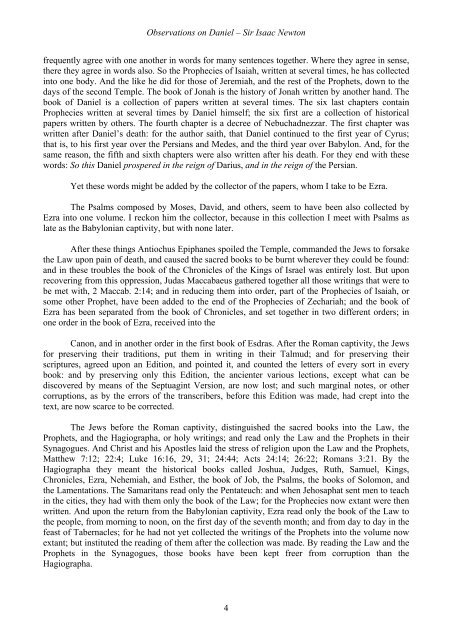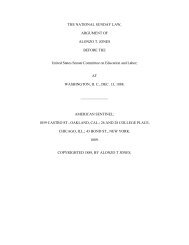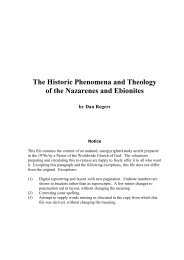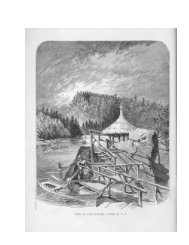Observations on Daniel - Newton.pdf - Online Christian Library
Observations on Daniel - Newton.pdf - Online Christian Library
Observations on Daniel - Newton.pdf - Online Christian Library
Create successful ePaper yourself
Turn your PDF publications into a flip-book with our unique Google optimized e-Paper software.
<str<strong>on</strong>g>Observati<strong>on</strong>s</str<strong>on</strong>g> <strong>on</strong> <strong>Daniel</strong> – Sir Isaac Newt<strong>on</strong><br />
frequently agree with <strong>on</strong>e another in words for many sentences together. Where they agree in sense,<br />
there they agree in words also. So the Prophecies of Isaiah, written at several times, he has collected<br />
into <strong>on</strong>e body. And the like he did for those of Jeremiah, and the rest of the Prophets, down to the<br />
days of the sec<strong>on</strong>d Temple. The book of J<strong>on</strong>ah is the history of J<strong>on</strong>ah written by another hand. The<br />
book of <strong>Daniel</strong> is a collecti<strong>on</strong> of papers written at several times. The six last chapters c<strong>on</strong>tain<br />
Prophecies written at several times by <strong>Daniel</strong> himself; the six first are a collecti<strong>on</strong> of historical<br />
papers written by others. The fourth chapter is a decree of Nebuchadnezzar. The first chapter was<br />
written after <strong>Daniel</strong>’s death: for the author saith, that <strong>Daniel</strong> c<strong>on</strong>tinued to the first year of Cyrus;<br />
that is, to his first year over the Persians and Medes, and the third year over Babyl<strong>on</strong>. And, for the<br />
same reas<strong>on</strong>, the fifth and sixth chapters were also written after his death. For they end with these<br />
words: So this <strong>Daniel</strong> prospered in the reign of Darius, and in the reign of the Persian.<br />
Yet these words might be added by the collector of the papers, whom I take to be Ezra.<br />
The Psalms composed by Moses, David, and others, seem to have been also collected by<br />
Ezra into <strong>on</strong>e volume. I reck<strong>on</strong> him the collector, because in this collecti<strong>on</strong> I meet with Psalms as<br />
late as the Babyl<strong>on</strong>ian captivity, but with n<strong>on</strong>e later.<br />
After these things Antiochus Epiphanes spoiled the Temple, commanded the Jews to forsake<br />
the Law up<strong>on</strong> pain of death, and caused the sacred books to be burnt wherever they could be found:<br />
and in these troubles the book of the Chr<strong>on</strong>icles of the Kings of Israel was entirely lost. But up<strong>on</strong><br />
recovering from this oppressi<strong>on</strong>, Judas Maccabaeus gathered together all those writings that were to<br />
be met with, 2 Maccab. 2:14; and in reducing them into order, part of the Prophecies of Isaiah, or<br />
some other Prophet, have been added to the end of the Prophecies of Zechariah; and the book of<br />
Ezra has been separated from the book of Chr<strong>on</strong>icles, and set together in two different orders; in<br />
<strong>on</strong>e order in the book of Ezra, received into the<br />
Can<strong>on</strong>, and in another order in the first book of Esdras. After the Roman captivity, the Jews<br />
for preserving their traditi<strong>on</strong>s, put them in writing in their Talmud; and for preserving their<br />
scriptures, agreed up<strong>on</strong> an Editi<strong>on</strong>, and pointed it, and counted the letters of every sort in every<br />
book: and by preserving <strong>on</strong>ly this Editi<strong>on</strong>, the ancienter various lecti<strong>on</strong>s, except what can be<br />
discovered by means of the Septuagint Versi<strong>on</strong>, are now lost; and such marginal notes, or other<br />
corrupti<strong>on</strong>s, as by the errors of the transcribers, before this Editi<strong>on</strong> was made, had crept into the<br />
text, are now scarce to be corrected.<br />
The Jews before the Roman captivity, distinguished the sacred books into the Law, the<br />
Prophets, and the Hagiographa, or holy writings; and read <strong>on</strong>ly the Law and the Prophets in their<br />
Synagogues. And Christ and his Apostles laid the stress of religi<strong>on</strong> up<strong>on</strong> the Law and the Prophets,<br />
Matthew 7:12; 22:4; Luke 16:16, 29, 31; 24:44; Acts 24:14; 26:22; Romans 3:21. By the<br />
Hagiographa they meant the historical books called Joshua, Judges, Ruth, Samuel, Kings,<br />
Chr<strong>on</strong>icles, Ezra, Nehemiah, and Esther, the book of Job, the Psalms, the books of Solom<strong>on</strong>, and<br />
the Lamentati<strong>on</strong>s. The Samaritans read <strong>on</strong>ly the Pentateuch: and when Jehosaphat sent men to teach<br />
in the cities, they had with them <strong>on</strong>ly the book of the Law; for the Prophecies now extant were then<br />
written. And up<strong>on</strong> the return from the Babyl<strong>on</strong>ian captivity, Ezra read <strong>on</strong>ly the book of the Law to<br />
the people, from morning to no<strong>on</strong>, <strong>on</strong> the first day of the seventh m<strong>on</strong>th; and from day to day in the<br />
feast of Tabernacles; for he had not yet collected the writings of the Prophets into the volume now<br />
extant; but instituted the reading of them after the collecti<strong>on</strong> was made. By reading the Law and the<br />
Prophets in the Synagogues, those books have been kept freer from corrupti<strong>on</strong> than the<br />
Hagiographa.<br />
4
















